DM168 Feature
Relief and dismay at delayed school reopening
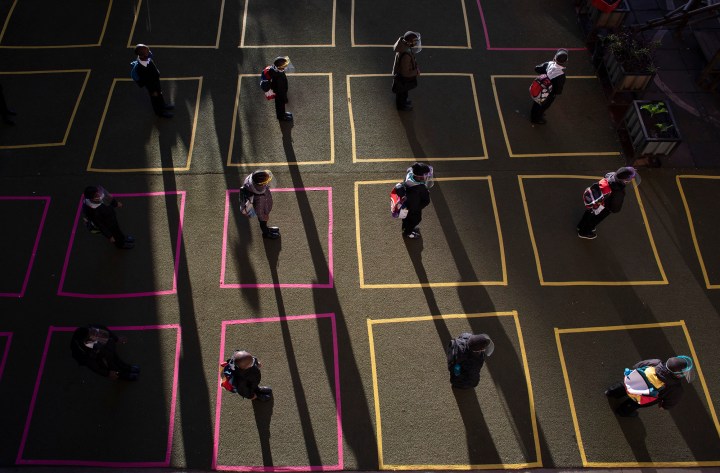
Schools will now only reopen for the new academic year on 15 February, pleasing some teachers and parents and angering others. Yet school closures ‘should be treated like a low-grade traumatic stress event for most children’.
First published in the Daily Maverick 168 weekly newspaper.
The announcement by the Department of Basic Education that the reopening of schools will be postponed to 15 February has been met with relief by many parents and teachers, who have experienced the brutal sweep of the second Covid-19 wave in their immediate families and communities.
The Covid-19 statistics speak for themselves. By 2021, nearly 1,700 teachers had died from Covid-19, and now the country is in the midst of a second wave that has resulted in an increasing number of deaths. In the week of 30 December to 5 January, 20,063 people died in one week from multiple causes, according to the 11 January mortality surveillance report from the Burden of Disease Research Unit at the South African Medical Research Council.
Sara Alleluia, a primary schoolteacher at a government school in Montana in Cape Town, said she was nervous about going back to school, “especially with the second wave”.
“I was telling a colleague that learners shouldn’t be coming back [so soon], especially with people dying like flies,” said Alleluia.
Abdul Kariem Matthews, who co-founded the Facebook group Save Our Children, which is opposed to reopening schools, said the government had wasted opportunities to engage with education experts to develop alternative modes of teaching and learning.
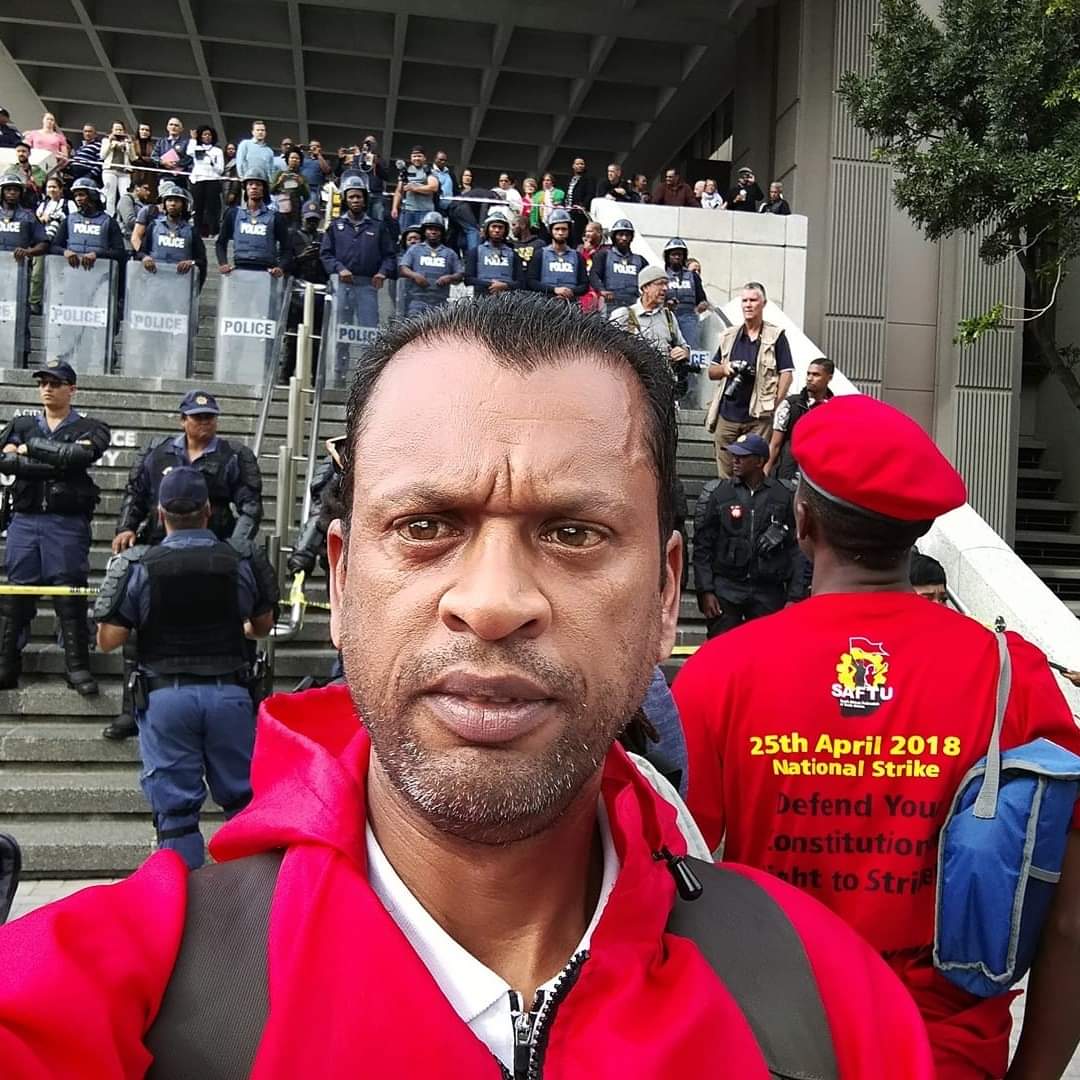
Abdul Karriem Matthews who started the Save Our Children Facebook Group said that government had wasted opportunities to find alternative learning that did not put both learners and teachers at risk of being infected with Covid-19
“They could’ve rolled out fibre in rural areas and townships to ensure children in those areas have access to the internet. I don’t think children should be going back to school and I think the government should’ve found alternative ways to continue with school,” said Matthews.
Vanessa le Roux, who started a Facebook group, Parents Against the Opening of Schools, criticised the department for “telling us to adapt to the new normal but they’re implementing old ways”. She said her son, who was doing Grade 8 at a public school last year, only went to school for exams and assessments. “Lucky for him, I could drop him off and fetch him but what about children who use public transport? We also don’t know what happens before and after school,” said Le Roux. Government officials did not consider the fact that children still shared stationery in many public schools, hugged each other and didn’t have homes big enough to physically distance, she added.
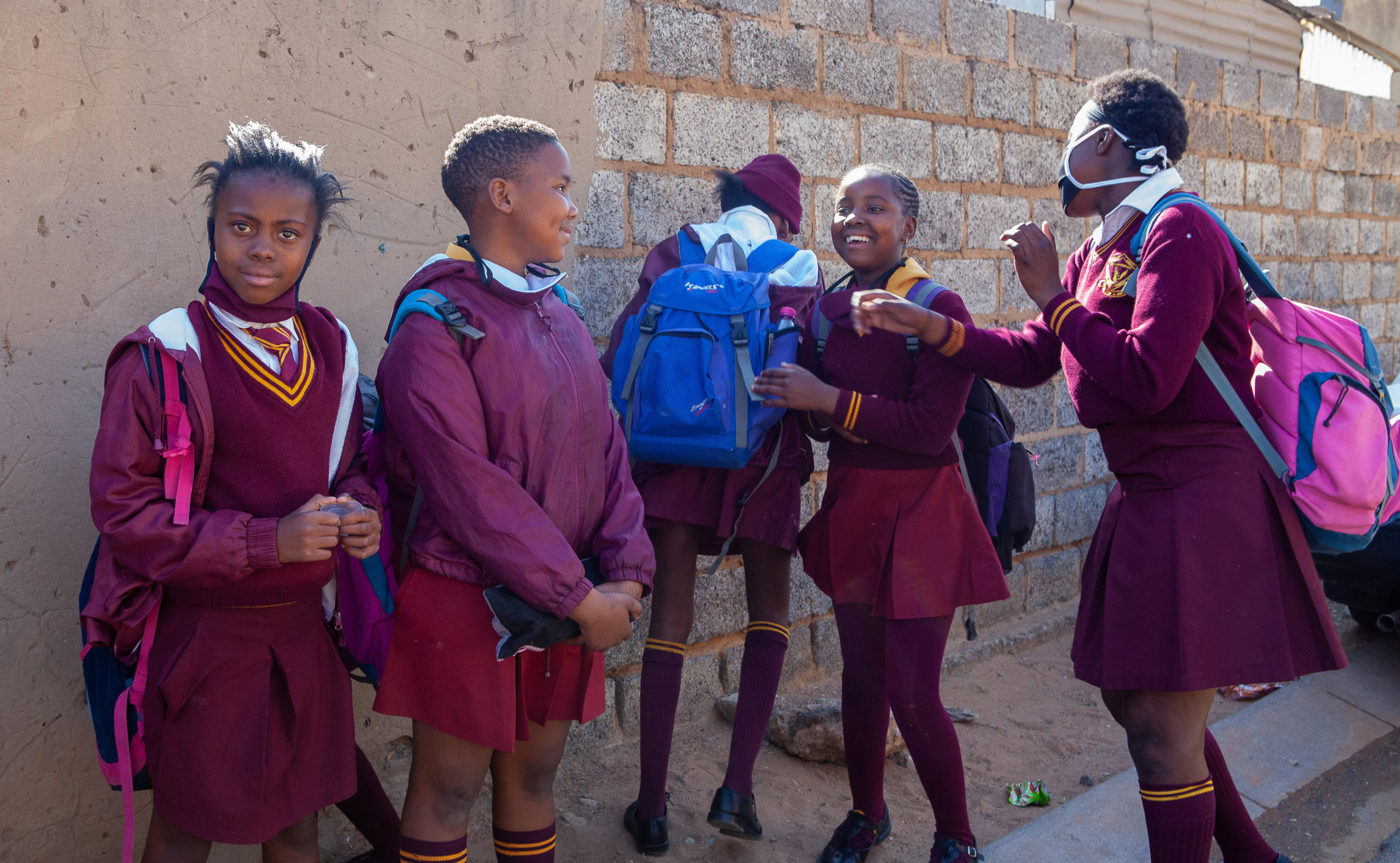
A general view of Tshireletso Primary School on August 24, 2020 in Soweto, South Africa. It is reported that students in grades R, 1, 2, 3, 4, 6, 9, 10 and 11 as well as pupils attending Schools of Skill in years 1, 2 and 3 returned to school. Some of the grades haven’t been in class since the end of March. (Photo by Gallo Images/Papi Morake)
When schools aimed to reduce the number of pupils at school by introducing rotational learning, where different groups of pupils attend classes on specific days, Alleluia said not all the children came back to school or they didn’t attend classes on a consistent basis, which left them behind in the school curriculum.
Another concern Alleluia had was enforcing the necessary health and safety protocols in the classroom.
“The majority of our learners come from Gugulethu, Bonteheuwel and those surrounding areas and a lot of them don’t physically distance at home. You find a learner telling you ‘My mommy said that Covid-19 doesn’t exist’, which makes it harder to enforce Covid-19 protocols,” said Alleluia.
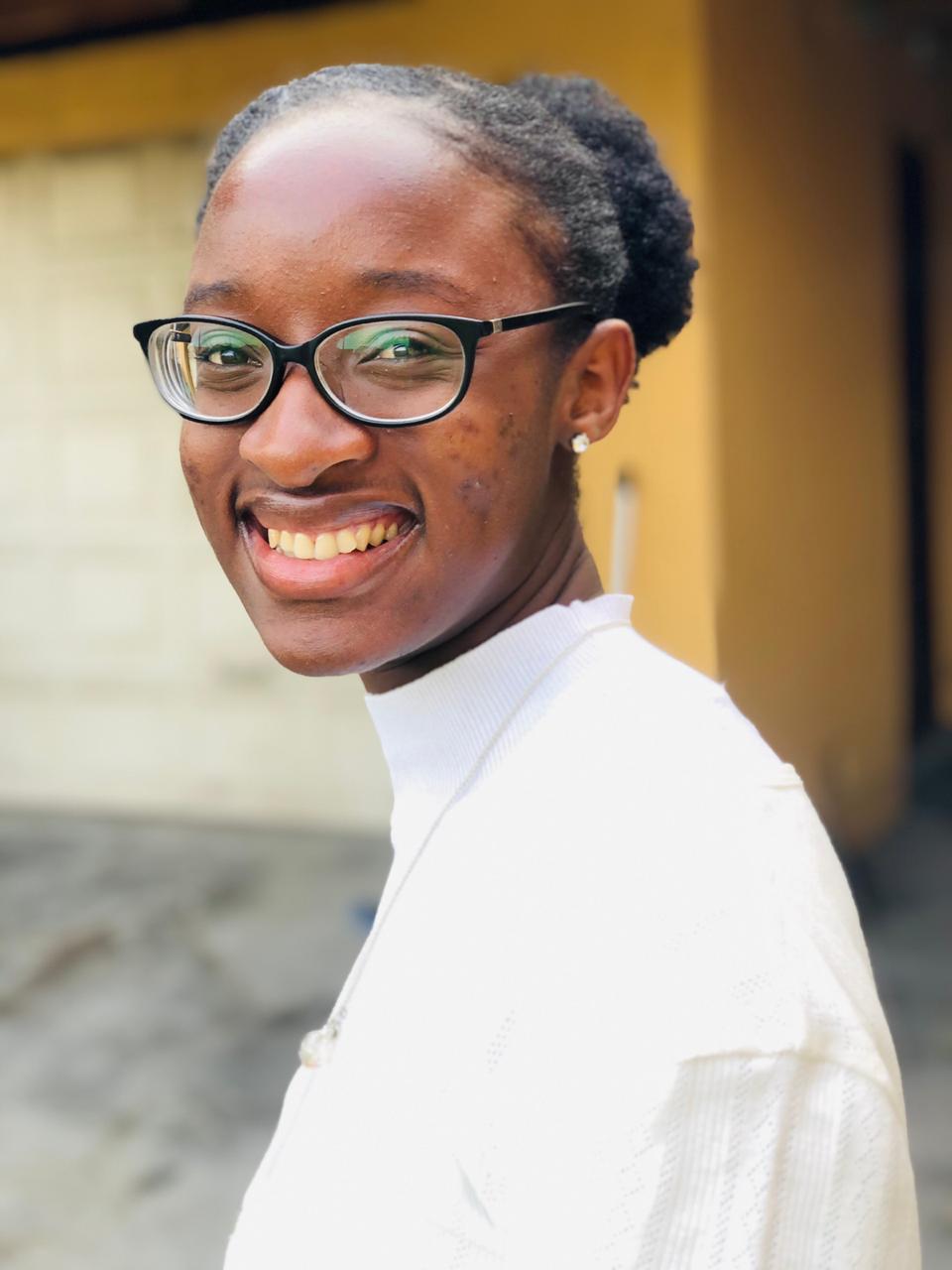
Sara Alleluia, a primary school teacher in Cape Town, is anxious about going back to school and thinks it would be better to delay reopening schools
Public schools were already under pressure last year as they had lost a significant number of teaching days. When lockdown was enforced in 2020, the National Income Dynamics Study, Coronavirus Rapid Mobile Survey released in September, found that children from grades 1, 2, 3, 4, 5, 8, 9 and 10 lost between 82 and 87 school days or 40% to 43% of the typically scheduled school days in a school year.
The pressure on teachers to complete the curriculum was compounded by the worry of getting Covid-19. “It was anxiety-inducing teaching last year because we also had a colleague die from Covid-19, so that’s also at the back of your mind,” said Alleluia.
An online survey by the Centre for Social Change at the University of Johannesburg in partnership with the Human Sciences Research Council (HSRC) found that anxiety about returning to school was more likely among low-income parents who were more likely to oppose the reopening of schools for the 2021 year than higher-income earners.
According to the survey, 53% of those earning less than R1,000 a month were against schools reopening, compared to 41% of those who earned more than R20,000 a month. The survey also found that differences in opinion about whether schools should reopen was divided by race.
According to the survey, 77% of Indian adults wanted schools to remain closed until the situation improved while 63% of coloured adults and 52% of black adults did not believe schools should reopen. Only 37% of white adults were opposed to schools reopening.
The online survey completed by 10,618 participants was conducted between 30 December 2020 and 6 January 2021.
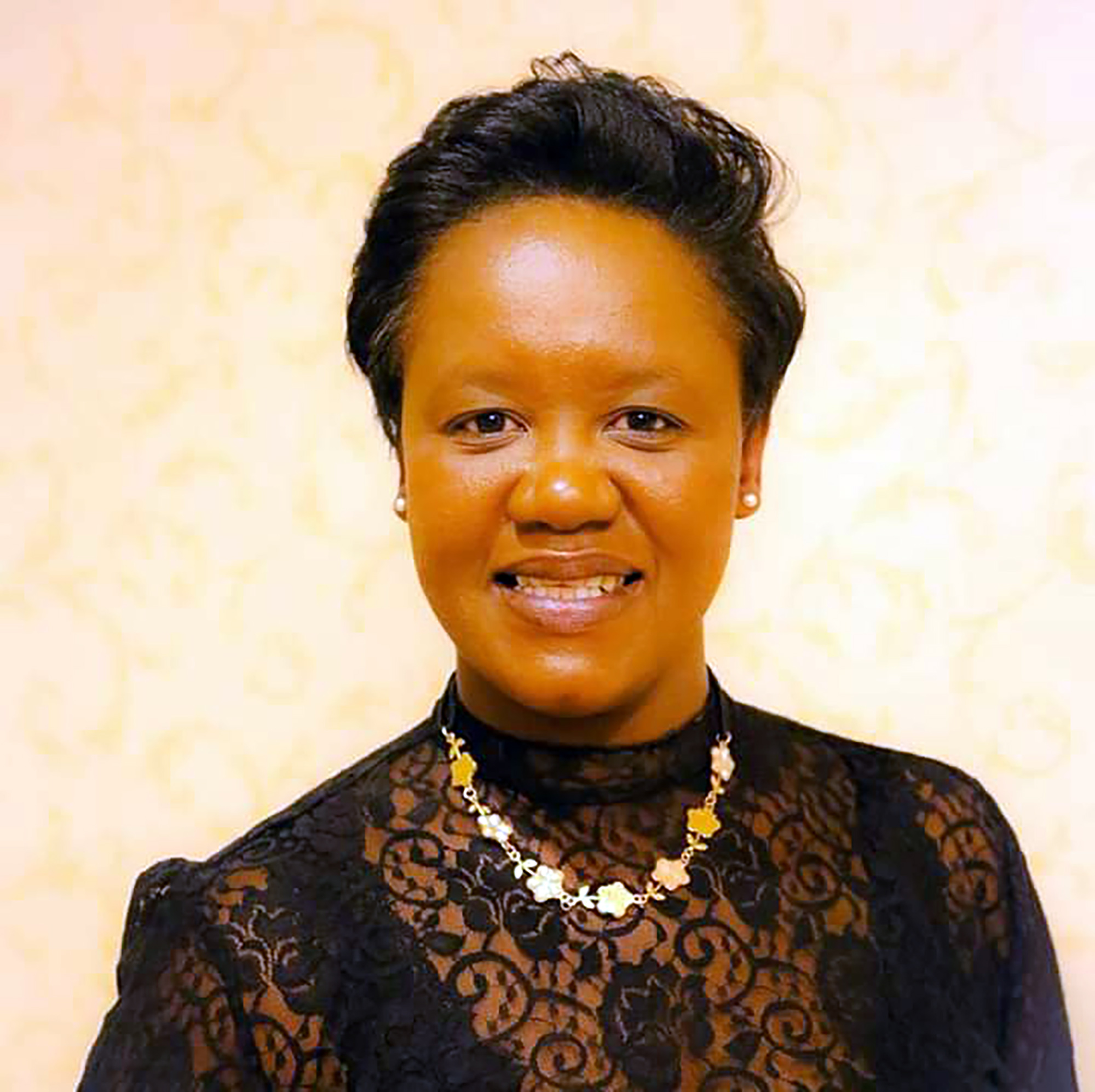
Vanessa le Roux. Photo:Supplied
Nic Spaull, an education researcher at the University of Stellenbosch, said: “Anyone dying from Covid-19 is a tragedy, so when we hear that by December nearly 1,500 teachers had died of Covid-19 this is extremely saddening. But this doesn’t mean that teachers are dying at higher rates than any other professionals. There have been more than 34,000 Covid-19 deaths in South Africa. Data from both Gauteng and the Western Cape show that trends in teacher infections and deaths are not different to those who are not teachers.”
Spaull added: “There is no data showing that schools increase infections. Transmission is primarily happening in the community rather than at schools. Schools have been closed for the last two months and yet infections have soared.”
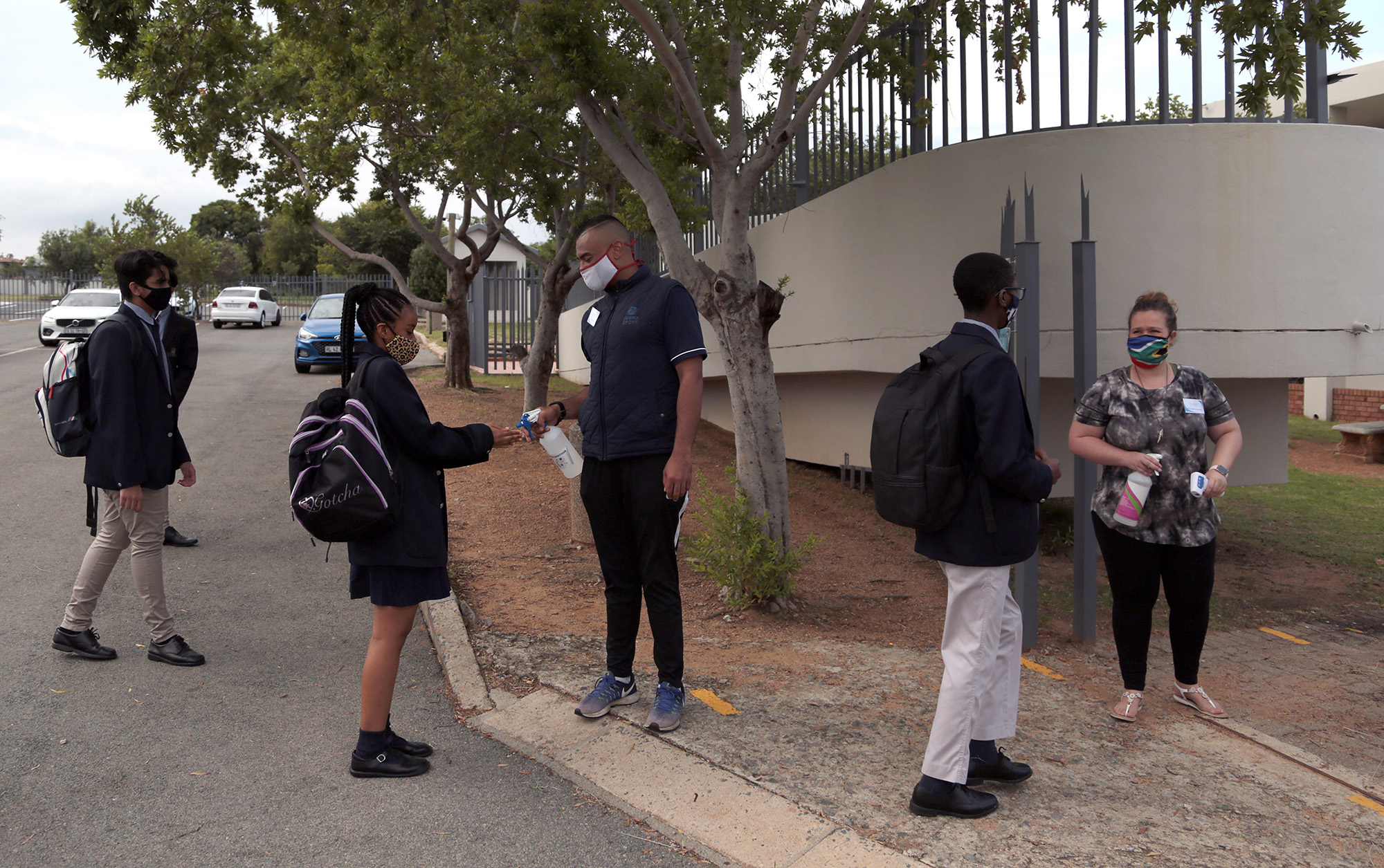
Curro Sagewood in Midrand reopened on wednesday 13 January 2020,learners and teachers were abiding to level 3 lockdown regulations Photo:Felix Dlangamandla/Daily Maverick
Nomusa Cembi, the South African Democratic Teachers Union’s media officer, said there was “lots of anxiety regarding going back to school”. The union had recently sent out a survey to members to get a sense of how well-prepared schools were.
“We think that schools are a much safer place for children but we also need to be guided by science. Right now, the science is saying that the infection rates are high, therefore we need to be more cautious. We want to be cautious but we also know that we can’t indefinitely close schools,” said Basil Manuel, the executive director of the National Professional Teachers Organisation of South Africa.
While some private schools opened their doors for the start of the 2021 school year on 13 January, Mzwandile Matthews, adviser to Angie Motshekga, the minister of basic education, said that the department had met with the National Alliance of Independent Schools Association (Naisa) and the Independent Schools Association of Southern Africa (Isasa) and had asked them to “persuade independent schools that haven’t opened to follow the reopening protocols” and for those that have opened to close as well. “We can’t direct them but we are expecting them to close,” said Matthews.
Isasa could not confirm how many of its members would be starting the year with online learning or in-person learning. “Although Isasa can make recommendations, each school takes the final decision regarding its reopening date, and whether the reopening will be in-person, online, or a hybrid model,” said Lebogang Montjane, Isasa’s executive director.
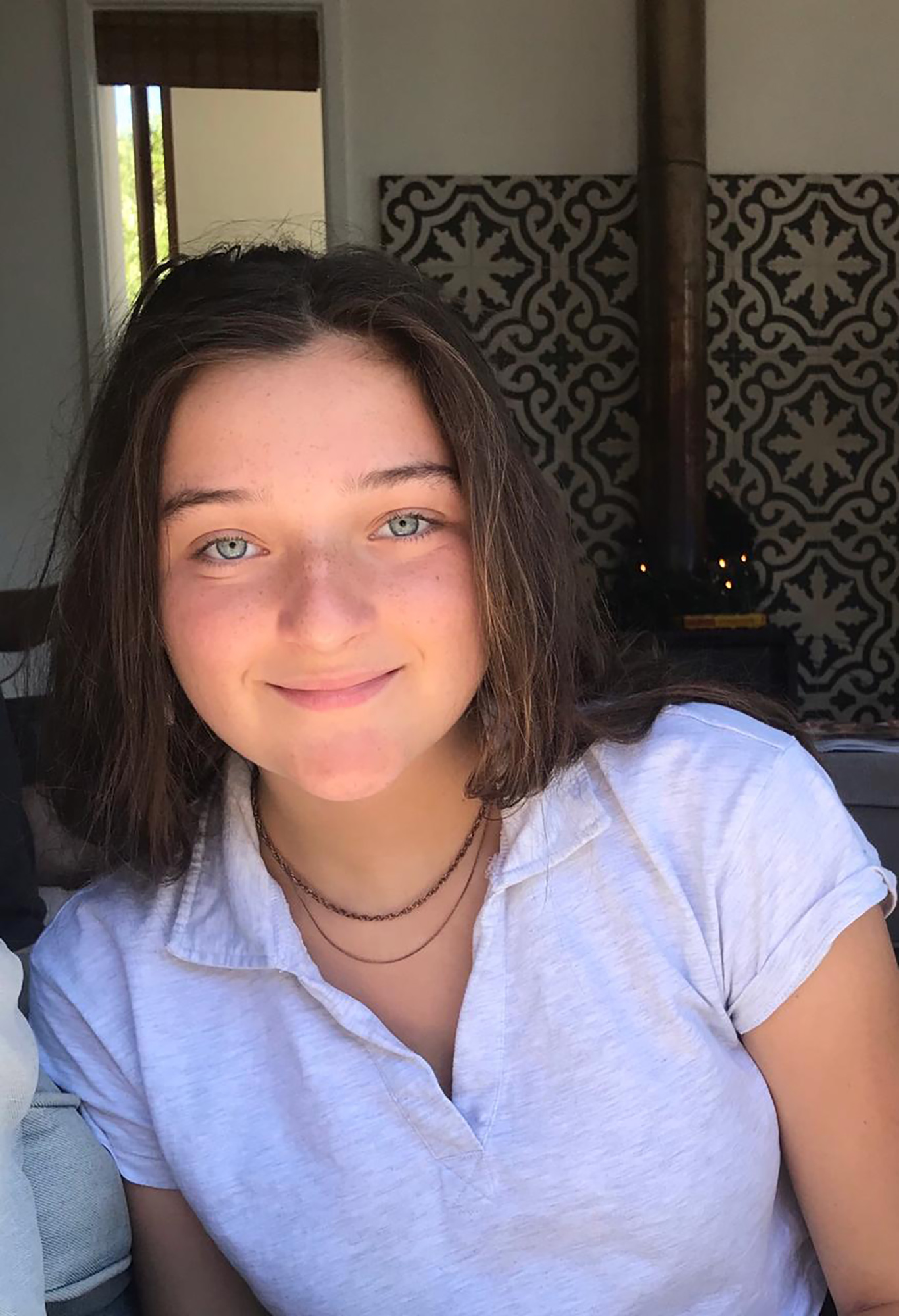
Aimee Kornblum, who’ll be doing grade 12 this year at a Cape Town private school, is looking forward to being back in the clasroom with her peers
With the second wave and rising number of infections, Ebrahim Ansur, Naisa secretary-general, said that schools would have to revisit their plans. “Others have started seriously looking at starting online learning to mitigate the loss of teaching.”
Portia Sibanyoni, whose 13-year-old is starting Grade 8 at Hatfield Christian School in Pretoria, said the school had been set to reopen on 18 January. “They’re going to have one week of in-person learning and one week of online teaching,” said Sibanyoni.
“It’s a tricky situation because last year he was in Grade 7 at a public school and they couldn’t do online learning and now going to a new grade, he’s going to have to play catch up because the previous year didn’t go that smoothly,” said Sibanyoni.
But she is certain that this year her son’s school year will go better as he is at a new and better-resourced school.
Neo Mphela, who is in Grade 10 at Cornerstone College in Pretoria, said he was eager to get back into the classroom.
Like many learners, he had to adjust to rotational learning and adhering to Covid-19 protocols at school.
“I’m excited to go back to school and I think that if we all follow the health and safety protocols, we’ll be fine,” he said.
Like many learners, he will only be going to school on certain days of the week.
Aimee Kornblum, who is in Grade 12 at a Cape Town private school, said she was looking forward to being in the classroom.
“Last year was a challenge as I had to get used to learning in a completely different way. My school gave us the option of being online or in school during the last few months of the year but most of the year was spent on the Microsoft online school platform Teams.”
Jeremy Kornblum, who has a 17-year-old, a 13-year-old and an 11-year-old, said that the private school his children went to had adhered to health and safety protocols in 2020 and that he was satisfied it would keep it up in the new school year.
“I think that they should go back [to school] and that the adults, including the parents, need to do their best to keep their children safe,” said Kornblum.
Greg Espey, who has a six-year-old daughter in a private school and a 10-year-old son in a public school in Cape Town, said: “It all comes down to leadership and communication; that’s what inspires confidence in parents.”
Espey said regular communication from the school regarding the protocols it had put in place made it easier to let his children return to the classroom.
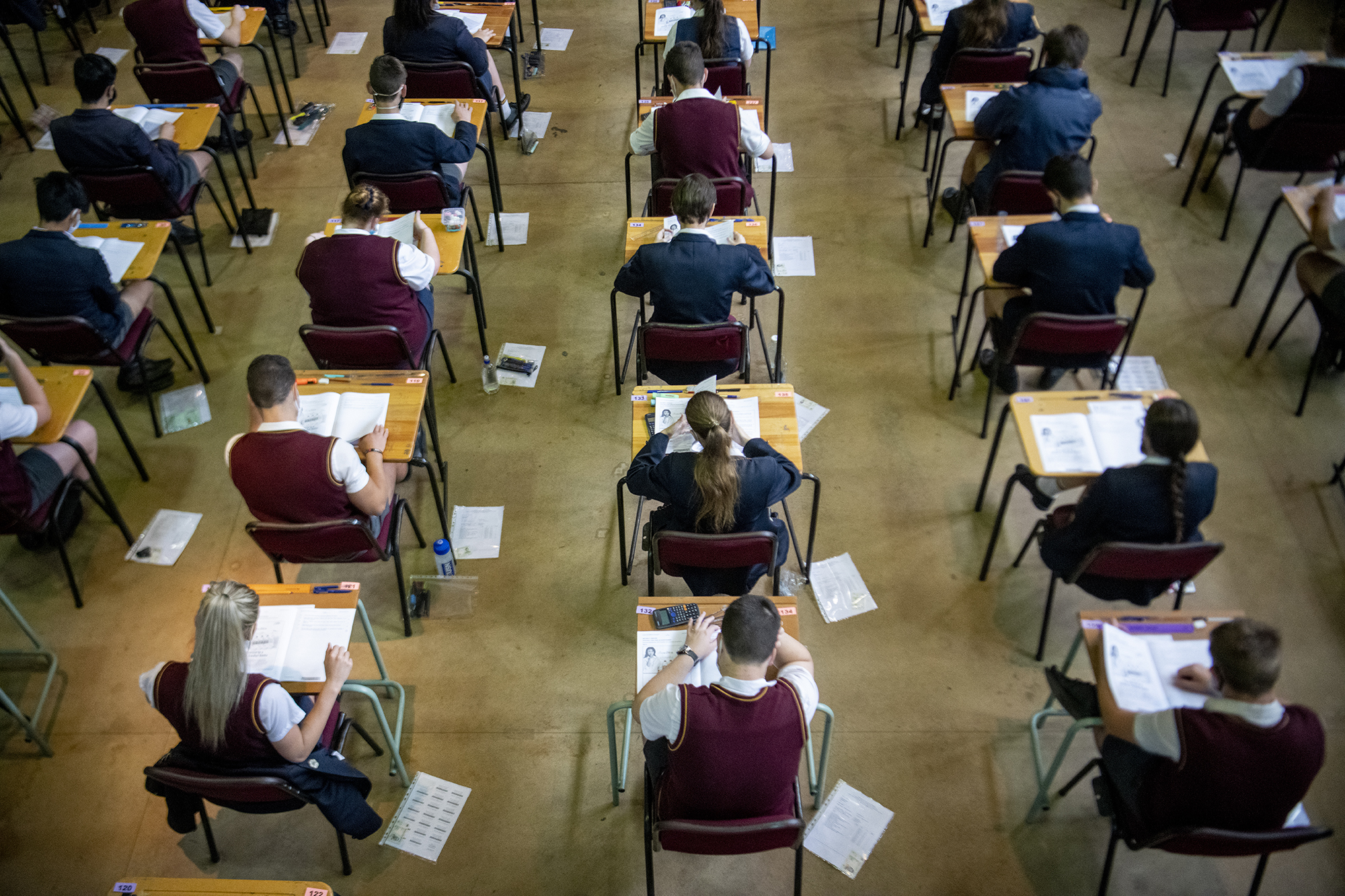
School exams at the Hoërskool Bellville in Bellville, Cape Town. Photo: Jaco Marais
The online survey conducted by the Centre for Social Change at the University of Johannesburg in partnership with the HSRC found that wealthier parents in suburbs could reasonably have greater confidence in the ability of their schools to provide a safe environment, compared to poorer parents in townships and informal settlements.
For Espey, being at school is an important part of any child’s development. “What we also have to consider is the social and mental health impact schools have for children. For them to learn and socialise with other kids is crucial for them,” said Espey.
Research in Hubei, the province in China where the virus first emerged, found that after a month of school closures, a quarter of children between eight and 12 years old showed symptoms of depression, which has led mental health practitioners such as Dr Jenny Radetsky to suggest that school closures be treated like a low-grade traumatic stress event for most children, and recognise that stress effects would be more severe in those with pre-existing emotional disorders and those from vulnerable families, she said.
Both Espey and Kornblum’s children had rotational learning last year, which Spaull described as nonsensical. “It doesn’t decrease risk and it halves the amount of learning taking place. The people who are at risk of adverse Covid-19 outcomes in schools are teachers, not learners,” said Spaull.
Last year, the National Institute for Communicable Diseases confirmed that children were less likely to die of Covid-19, while the disease was usually mild among school-going children, aged between five and 18.
“I don’t think we’re thinking enough about what we’re going back to because from the teachers I’ve spoken to they tell me what they’re going back to isn’t any meaningful teaching but lots of bureaucratic procedures of scanning and taking temperatures,” said Sara Black, an education researcher at the University of Johannesburg.
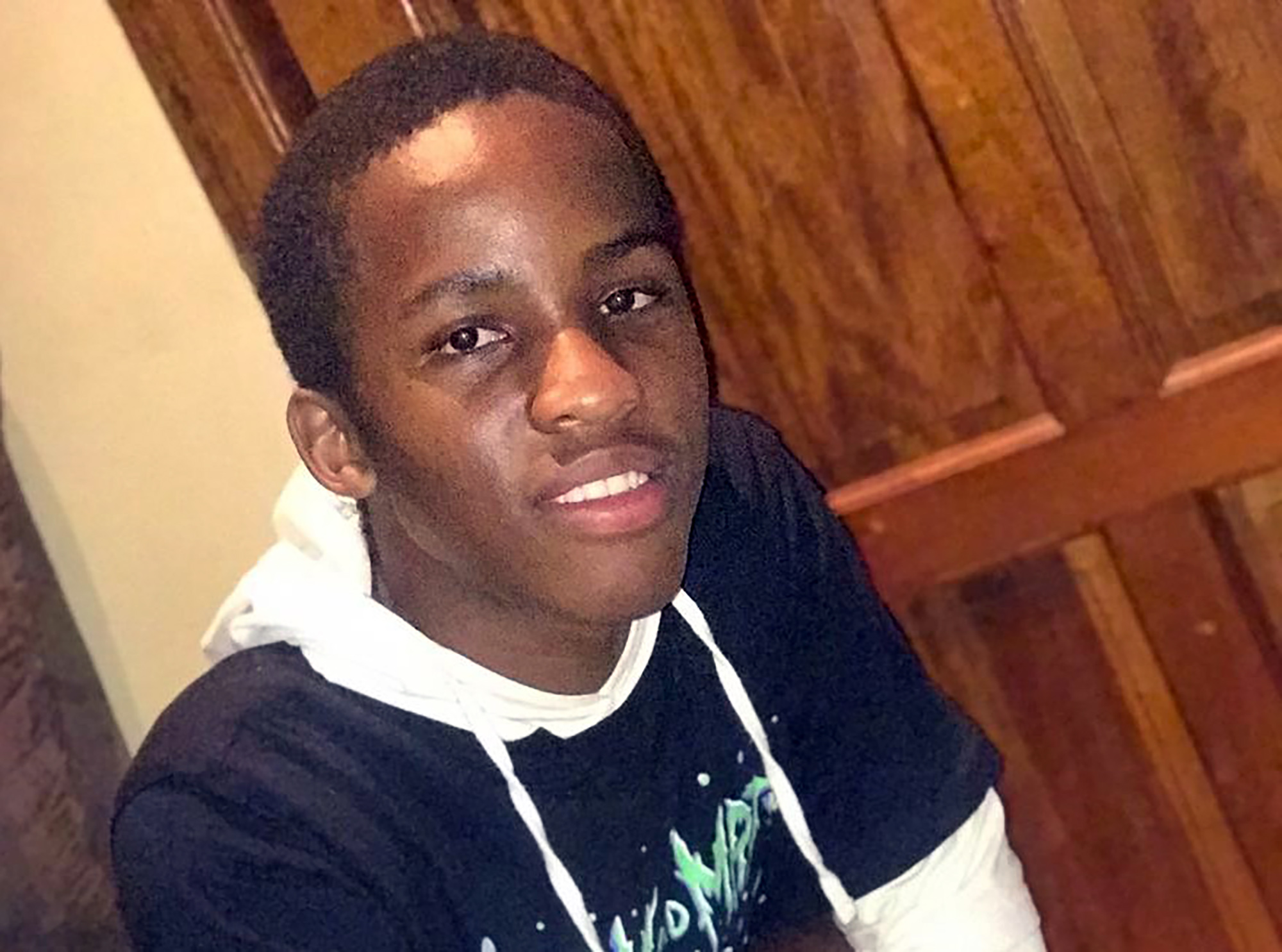
Neo Mphela, a Pretoria grade 10 pupil, will be going to school a few days a week as schools try to reduce the number of pupils on the premises amid the second wave
But private schools weren’t always losing out on teaching, according to Isasa’s Montjane.
“Independent schools’ willingness to embrace different education delivery models has been key in enabling them to continue with teaching and learning even when the country was in lockdown. This includes, but is not limited to, online education. During the lockdown last year, for example, many low-fee independent schools were able to distribute learning material on flash drives, collected from central locations together with food parcels for needy students and their families.” DM168
This story first appeared in our weekly Daily Maverick 168 newspaper which is available for free to Pick n Pay Smart Shoppers at these Pick n Pay stores.

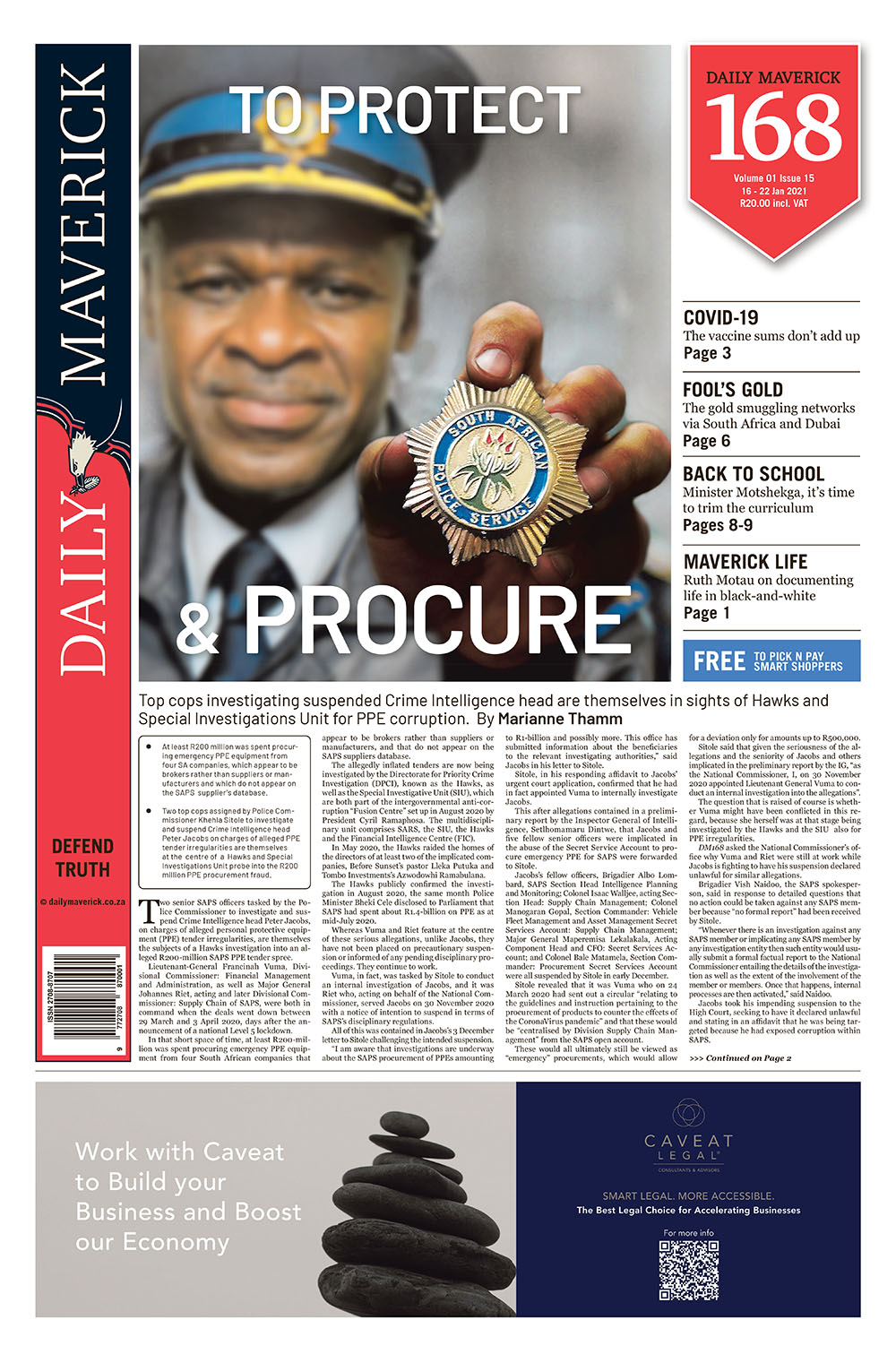

















 Become an Insider
Become an Insider
why do we go for this thing that if any kids can’t do school then no kids should do school??? There must be hundreds of private or small schools that can open very safely – imagine a farm school in NCape.